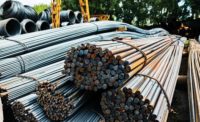President Trump’s decision to impose tough tariffs on steel and aluminum imports from Canada, Mexico and the European Union quickly sparked retaliatory measures and is expected to lead to cost increases for U.S. construction contractors and for makers of construction equipment.
The White House announced on May 31 that 25% tariffs on steel imports from the three targeted exporters and 10% charge on their aluminum shipments to the U.S. would take effect on June 1.
Brian Turmail, an Associated General Contractors of America spokesman, said via email, “We are deeply troubled that the administration has opted to impose these costly new tariffs on trade from many of our closest trading partners.”
Turmail said that in the past few months many AGC firms have seen prices of products such as rebar climb by 15% to 20%, as suppliers anticipated that the U.S. would impose at least some tariffs.
He also said further increases are likely and contractors probably will factor the materials price hikes into their bids, thus “raising the cost of all manner of construction including infrastructure.”
Anirban Basu, Associated Builders and Contractors chief economist, said in a statement that the steel and aluminum tariffs are "likely to accelerate construction materials price appreciation during the next several months."
The Association of Equipment Manufacturers strongly criticized the Trump administration’s action. AEM President Dennis Slater said in a statement, “These harmful tariffs will directly contribute to higher steel prices, increase costs for agriculture and construction machinery, wreak havoc on the business operations of equipment manufacturers, and jeopardize many of the 1.3 million good-paying jobs our industry supports."
But the American Iron and Steel Institute praised Trump's move. Thomas J. Gibson, AISI president and CEO, said in a statement, "“The president’s trade actions have already begun putting steel workers back to work in Ohio and Illinois and we are grateful for the administration’s commitment to the nearly two million jobs supported by the domestic steel industry.”
Trump, seeking to aid U.S. steelmakers and aluminum producers, announced tariffs on a wide range of countries on March 8 but delayed implementing them so negotiations toward resolving the issue could proceed. Some agreements were reached, including deals with Australia, Argentina and Brazil on steel.
But the White House said in a May 31 statement that the U.S. "was unable to reach satisfactory arrangements...with Canada, Mexico or the European Union, after repeatedly delaying tariffs to allow more time for discussions."
Countermeasures
The targets of the U.S. tariffs swiftly announced they would retaliate. In Canada, Prime Minister Justin Trudeau called the U.S. tariffs “totally unacceptable.” Minister of Foreign Affairs Chrystia Freeland said Canada would impose $12.8 billion in charges on U.S. shipments of steel, aluminum and other products.
Freeland said, “This is the strongest trade action Canada has taken in the post-war era.”
In Mexico, President Enrique Pena Nieto said in a statement that his country would “immediately implement compensatory measures for an amount comparable to the effects this will cause, which will be in force for as long as the U.S. government does not eliminate the tariffs."
European Commission President Jean-Claude Juncker said in a statement said the new U.S. tariffs were “unjustified and at odds with World Trade Organization rules.”
He said the EU would will impose “additional duties on a number of imports from the U.S.” and launch a WTO dispute-settlement case.
Story updated on 6/4//18 with comment from Associated Builders and Contractors' chief economist.




Post a comment to this article
Report Abusive Comment